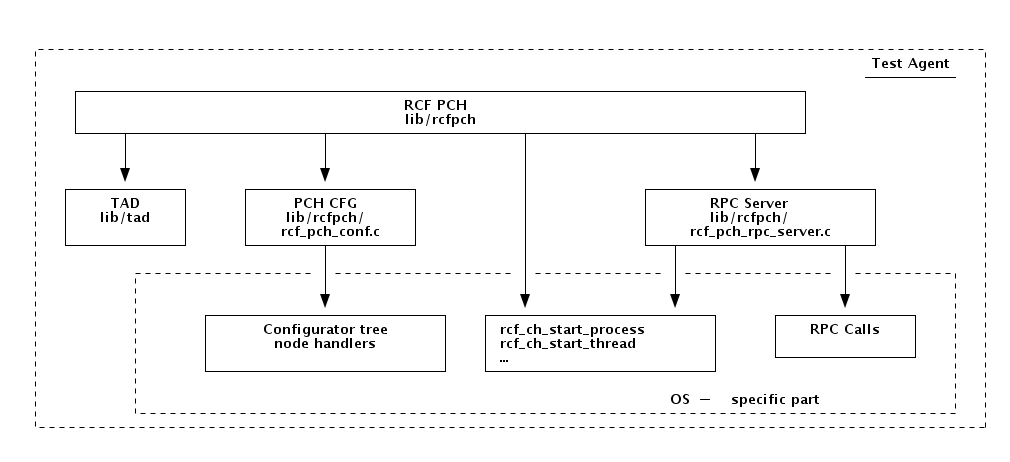Test Agents
Introduction
Test Agent is a piece of software that in general runs on dedicated host and exports functionality necessary to configure test set-up, generate some traffic, or receive some statistics from device under test or auxiliary testing components. Depending on the particular type of an Agent, it can operate as a single process or as a set of processes or threads.
The Agent is a component that is intended for future amendments, extensions and porting to different platforms.
At the time or writing this document TE has Test Agents available for the following Operating Systems:
Linux;
FreBSD;
Windows.

Depending on the physical location of Test Agent and the device it controls we can differentiate Agents as following:
Auxiliary Agent
Test Agent running on an auxiliary station and controlling this station.
Test Protocol is used over a network and all commands are applied to the station on which Test Agent runs. Such Agents are necessary when we do Black Box testing:
to emulate presence of some software or hardware component in the test set-up;
network protocol testing (sending/receiving protocol data);
in interoperability testing;
external interface testing (SNMP, TR-069, CLI).
Please note that a Test Agent can be run on the same station as Test Engine, the only difference is that reboot command should never be applied to this Test Agent;
Proxy Agent
Test Agent running on an auxiliary station and controlling the DUT.
Test Protocol is used over a network and all commands are applied to the DUT (Test Agent interacts with the DUT via a DUT-specific interface).
This kind of Agent is necessary when we need to be able to configure DUT during test scenario or when we want to control some external equipment that provides facilities necessary in the particular test scenarios, but at the same time we only have some external interfaces exported by DUT or auxiliary equipment.
Embedded Agent
Test Agent running on a DUT and controlling the DUT.
Test Protocol is used over a network or over some other transport (for example, over a serial port) and all commands are applied to the NUT.
This kind of Test Agent is necessary when we want to do White Box testing (i.e. when we are able to integrate our software components into the DUT):
Module testing;
DUP API testing;
DUT-specific management.
All communication with Test Agents performed via Remote Control Facility (RCF) components. Interactions are done with text-based Test Protocol.
Test Agent Organization
Basically Test Agent consists of:
start-up code;
generic part - Portable Command Handler (PCH) (sources under lib/rcfpch directory);
OS-specific part - Command Handler (CH) - functions called by PCH (for more information see Test Agents: Command Handler);
OS-specific implementation of callbacks for configurator tree (see Command Handler: Configuration support interface);
a set of functions used in RPC;
a number of standard RCF Services supported in separate libraries (like TAD).

On start-up Test Agent does the following things:
calls ta_log_init() to initialize logger API;
if a Test Agent supports process or thread creation (rcf_ch_start_process(), and rcf_ch_start_thread() are supported), then it is necessary to create a separate thread or process that will receive log messages from different processes and threads run on behalf of Test Agent. lib/loggerta library exports logfork_entry() function that should be used as an entry point for such a thread/process;
calls rcf_pch_run() function that passes control to RCF Portable Command Handler.
In RCF PCH Test Agent passively waits for Remote Control Facility (RCF) commands. RCF commands are handled in the main loop of RCF PCH library. Depending on the command type it can be handled either by generic part of RCF PCH (located under lib/rcfpch) or it can be directed to Agent specific parts of code (located under agents/[type]).
Functions declared in lib/rcfpch/rcf_ch_api.h should be exported by a Test Agent, though they can return -1 telling that an operation is not supported.
Types of supported Test Agents
Currently we support two main types of te_agents:
Extending Test Agent with new functionality
Adding new RPC calls
RPC Development Framework section gives guidelines on how to add support for a new RPC call.
Adding new configuration nodes
Test Agents: Creating new configuration nodes in Test Agent page gives guidelines on how to add new configuration nodes to Test Agent;
API Usage: Configurator API page gives guidelines on how to work with API from test scenarios.